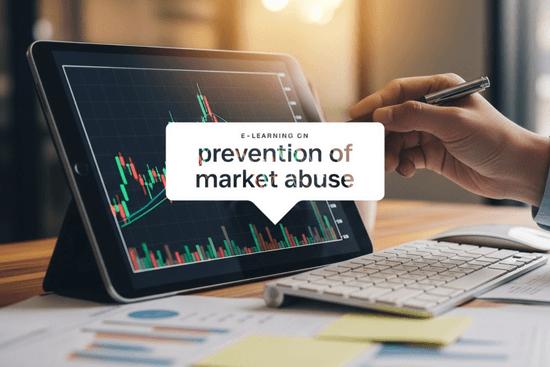When it comes to preventing market abuse, ticking off regulatory checklists is no longer enough.
Today’s Indian corporates must go beyond basic compliance—they must build a culture where awareness of insider trading, market manipulation, and ethical practices is ingrained into everyday behavior.
True protection from market abuse comes when compliance is not just an annual task, but a shared mindset across your organization. Continuous learning in the form of e-Learning on prevention of market abuse can be a critical step in building compliance culture.
Understanding Market Abuse: A Quick Recap
Market abuse covers a range of unethical behaviors that undermine fair trading, such as:
-
Insider Trading: Trading based on unpublished price-sensitive information (UPSI)
-
Market Manipulation: Artificially influencing security prices
-
Front Running: Misusing client orders for personal benefit
-
Spreading False Information: Distributing misleading news to influence markets
SEBI’s regulations are clear and stringent. However, regulatory rules alone won’t prevent breaches—awareness, vigilance, and ethics at every level of the organization will.
Why Moving from Compliance to Culture Matters
When employees view compliance as just a set of rules to follow, they may:
-
Treat it as a formality
-
Find loopholes
-
Forget rules in day-to-day decisions
But when they see ethical behavior as part of who they are as professionals, they naturally act in ways that protect the organization’s interests.
Embedding a compliance culture around market abuse prevention helps companies:
-
Minimize regulatory risks
-
Protect their reputation
-
Build investor and stakeholder trust
-
Foster a high-integrity work environment
How to Embed Market Abuse Awareness into Your Organization’s Culture
1. Lead From the Top
Leadership must set the tone. When senior executives openly discuss compliance and ethics—and act accordingly—it signals to employees that these values are non-negotiable.
2. Invest in Meaningful Training
Standard one-off seminars won’t cut it.
Modern companies are using interactive e-learning on prevention of market abuse that offer:
-
Real-world case studies
-
Scenario-based decision making
-
Quick quizzes and certifications
Training should be mandatory, engaging, and refreshed regularly.
3. Integrate Compliance into Daily Workflows
Rather than viewing compliance as an annual event, embed it into everyday operations:
-
Pop-up reminders about trading windows
-
Mandatory declarations when handling UPSI
-
Quick learning nudges through micro learning videos or modules on prevention of market abuse during major financial events
4. Encourage Open Communication
Create an environment where employees feel comfortable asking questions about grey areas and reporting suspicious activities without fear of retaliation.
Anonymous whistleblower mechanisms, open-door policies, and regular compliance check-ins make a big difference.
5. Recognize and Reward Ethical Behavior
Highlight employees who exemplify ethical decision-making.
Recognizing good behavior sends a clear message that ethics are valued, not just compliance with rules.
6. Measure and Improve Continuously
Track training completion rates, gather feedback on compliance programs, and audit employee awareness regularly.
Culture isn’t built overnight—it requires continuous monitoring and reinforcement.
Conclusion: From Policy to Practice
Regulations can mandate compliance, but only a strong internal culture can truly prevent market abuse.
By embedding awareness, ethics, and vigilance into your company’s DNA, you safeguard not just against regulatory penalties, but also against lasting reputational harm.
Ready to move from ticking boxes to building a culture of compliance?
Explore our tailored e-learning solution that help Indian corporates make market abuse awareness part of their everyday work life.
continue reading




